Review: The Paper, "Pilot" | Season 1, Episode 1
A belabored premiere shows a spinoff fighting for its own identity
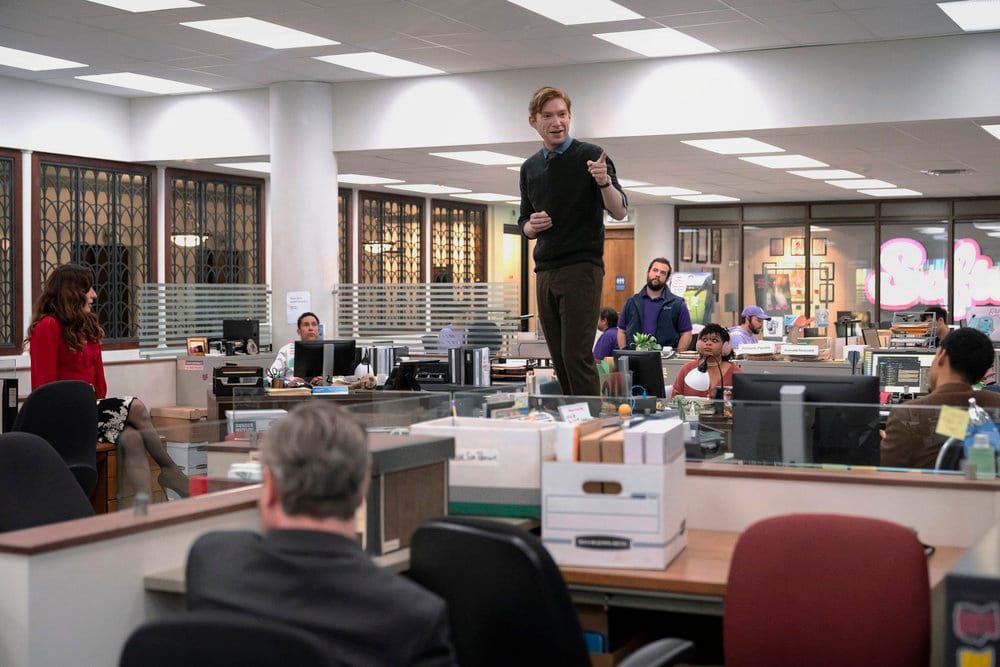
Welcome to Episodic Medium's coverage of The Paper, a spiritual successor to and quasi-spinoff of The Office. Our reviews of the season will be spread out over the next week and a half, and as always subsequent reviews are exclusive to paid subscribers. We are currently running our yearly subscription drive, where annual subscriptions are at their lowest price. Find out more here.
As is the case with many modern streaming series, The Paper was originally launching with multiple episodes: if you had logged onto Peacock today, you would have had four episodes of the show waiting for you.
Then something changed: just two weeks before the show was set to debut, Peacock announced that it would in fact release all ten episodes of the first season at once. And while I raise an eyebrow at the suggestion this was done based on “good buzz,” I am not going to argue it’s a bad decision. Many of the biggest fans of The Office watched the show years after it debuted, making binge viewing a central part of their connection to the show. Additionally, comedies are notoriously difficult to sell to audiences, given they often need time to work through the growing pains of setting up a whole new situation. If you were to go back in time to 2005 when The Office debuted its six-episode first season, or 2009 when quasi-spinoff Parks and Reaction followed suit, chances are viewers would have responded to those seasons better if they had seen them all at once, given how much better they were by their first season finales.
Now, this did complicate my plans to write about the show, but regardless of the distribution strategy I always wanted to write about the first episode on its own. Given the choice to refer to this as “Pilot” despite the fact the show was ordered straight-to-series after Greg Daniels and a team of writers brainstormed ways to extend the franchise, it’s important we consider this episode individually. Although Peacock will no doubt auto-play the second episode as soon as this episode is finished, it is a discrete unit of storytelling, one clearly interested in the work of setting up the premise of the show in front of us.
I will acknowledge up front that the least interesting work here is the attempts to tie this to The Office. Opening with an update in Scranton as Bob Vance of Vance Refrigeration reminisces about Dunder Mifflin and confirms the company has been gone since 2019 is inoffensive, but it’s also functionally unnecessary. There’s a reason, after all, that they ended up abandoning the idea of Parks and Recreation and The Office being in the same universe. I understand that this is a different moment, one where legacyquels and revivals are dominant, and where it’s launching on a streaming service that has made The Office a huge part of its identity. But this isn’t either of those things, and opening with it strikes me as a capitulation to context at the expense of the story being told.
Because The Paper has its own frame story built in. When we eventually transition from Scranton to Toledo, where Enervate—the company that purchased Dunder Mifflin—is headquartered, Ken is explaining the hierarchy of paper products they produce. Placing the newspaper at the very bottom, he reveals that the company’s offices used to be occupied entirely by the Toledo Truth Teller, and the documentary shifts focus back to the newsroom as it appeared in 1971. It turns out that someone produced a documentary about the paper at that time, and we’re introduced to editor John Stack (Tracy Letts). The documentary becomes a window into a different era of journalism, a point of contrast for the state of the Truth Teller as it stands, and an aspirational goal for the paper under its new editor-in-chief, Ned Sampson.
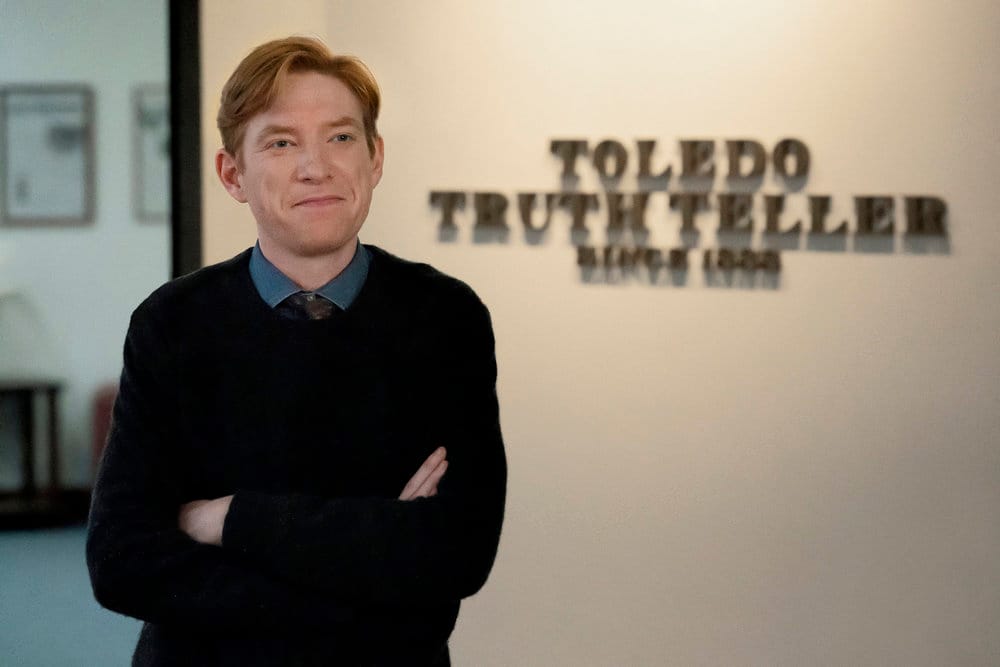
On the whole, “Pilot” is more concerned about this documentary connection than the fact that this is the same documentary crew that followed Dunder Mifflin twenty years ago. The opening credit sequence represents this, exploring all the ways newspapers are used other than reading, whether as wrappers for food or packing paper for moving. The current state of the Truth Teller is dire under managing editor Esmeralda, with a combination of celebrity-oriented clickbait written in-house and celebrity-oriented clickbait pulled off of the Associated Press wire. There’s one reporter who’s barely awake, a circulation employee whose job is mainly scraping data from their website visitors, and a disheartened compositor who has to turn it all into a front page for a paper so disconnected from local news that they don’t even notice the fire blazing in a nearby building. Ned’s arrival comes with its share of comic hijinks, but it also comes with a clear mission to change all of this, no matter what it takes. And it’s hardly a surprise when we discover him watching the Truth Teller documentary in his new office, looking to build in Stack’s image.
In this way, The Paper is really closer to Parks and Recreation if we drill down on it. While Michael Scott was an idealist, he was also a narcissist, and the show lived in the interplay between those two parts of himself (with a complete lack of self-awareness and good taste thrown in for good measure). By comparison, as Parks figured out Leslie’s character, they realized that the comedy came from how unfailing her optimism was in the face of bureaucratic limitations. Ned is in this same tradition: he romanticizes his job to the point of being marginally disconnected with reality, and it means that sometimes he doesn’t notice when someone bumps into him and loses their entire salad, but he is ultimately a good person trying to do good things. The problem is the system that won’t let him do so, led by Ken as the manager controlling the purse strings, and Esmeralda as the former reality show star whose lack of journalistic experience made her a perfect leader for the version of the Truth Teller Ken wanted.
It’s also closer to Parks in that the workplace is more logically driven toward common action. Dunder Mifflin sold paper, but its collective office culture was mostly a product of Michael’s management style—the amount of time they spent in the meeting room was probably unnecessary to help them sell paper. But what Parks and The Paper share is the idea that these people are working together for a cause, whether that’s serving the public or informing the public. Both shows also follow a charismatic and idealistic leader trying to herd a group of employees who just want to collect their paychecks, asking them to buy into ambitious projects without any promise of advancement. It creates a clear division across what used to be the newsroom and is now an office shared with the rest of Enervate’s companies: compositor Mare and Nicole from circulations are excited by the possibility of change, but sales rep Detrick rejects it wholesale because he doesn’t want Esmeralda to take her anger out on him.
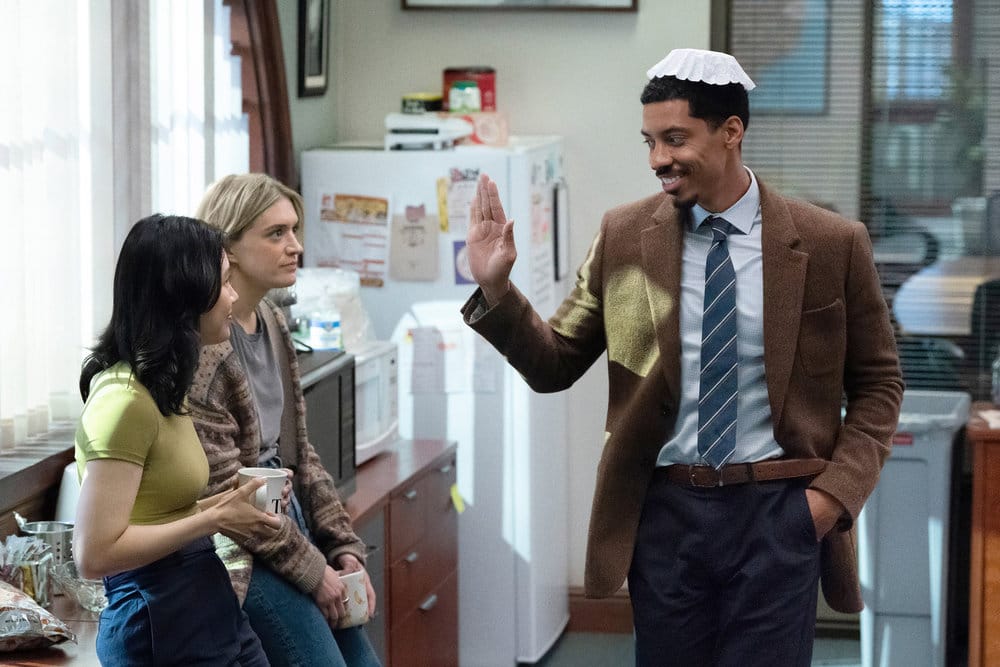
Like all comedy pilots, The Paper’s doesn’t really get to flesh out the ensemble. We get some introductory talking heads with all of them, but the dynamics between them are relatively thin. Detrick seems to be something of an annoyance to the other employees (despite the fact he’s not supposed to interact with them), while there’s tension between the two junior accountants, Adam and Adelola. These characters all suffer a bit because we know the shows this one is based on, and we know how much the supporting casts of those shows became a part of their appeal over time. What we struggle to remember the same way was how anonymous they were in the series’ pilot, and how much the shows’ lengthy runs and 20+ episode seasons created the opportunity for those characters to grow. This is something that The Paper will never have by comparison, though, limited here to 10 episodes. It makes me curious to see just how differently they treat the outer edges of the ensemble, compared to the core storyline.
That core is clearly Ned’s new leadership, with Esmeralda as his nemesis and Mare as his ally. Even if we didn’t know this was a spinoff of The Office, the romanticism of Mare bringing Ned down to see the old printer certainly hints at a possible relationship between them, but there’s no direct signs of that here. This is, after all, a sitcom pilot: there is only so much you can do. And that’s probably why I’m mildly annoyed that so much of it ended up being committed to the connection to The Office. Is the chyron about Oscar’s 2005 release form having no expiration funny? Yes. But I’m still not sold on his presence in this workplace having value, given that his unwillingness to talk to the cameras earnestly means we don’t have any idea of what his life is like or his feelings about the state of things. I get why it’s so present in this first episode, but it’s a balance the show is going to need to approach carefully as it continues, and something I’ll definitely be tracking as we move through these episodes in the week ahead.
Stray observations
- Welcome to Episodic Medium’s coverage of The Paper. I had originally planned to spread out these reviews weekly, of course, but that changed with the binge release. I’ll be reviewing the next three episodes on Monday, when you’ve had time to sample them, and then I will post a new review of two episodes every two days after. This means the review of the final two episodes will be posted next Sunday.
- If you’re unfamiliar with my history with this particular franchise, here’s the oral history of writing about the show for The A.V. Club (featuring me and my editor, Emily St. James), and my more recent newsletter reflecting on those reviews being unearthed by the Office Ladies podcast. And no, despite having run out of episodes to talk about, the Office Ladies have still not invited me on their podcast.
- I know this is partially just because it’s a different era social media wise, but it’s weird to see Alex Edelman—who is taking the B.J. Novak/Mindy Kaling role as a writer-performer—in such a small part considering his relative fame compared to so much of the rest of the cast.
- I’m still on the fence in terms of Esmeralda as a character, but Sabrina Impacciatore really nailed “maybe a piece of cheese,” and I appreciate they’re letting her be Italian even if they’re not letting Domhnall Gleeson be Irish.
- There’s a weird little slice of life scene where Oscar is talking to the Softees bro about hitting a deer with his car, and I’m curious what the function of that scene is meant to be. I don’t have an immediate answer, so perhaps this is a character dynamic they intend to explore further.
- My favorite Oscar moment was his quick pickup on “Fantine” being from Les Mis, which Detrick somewhat surprisingly picked up on as well. And yes, this is mostly because it’s one of his few moments unrelated to the Office of it all.
- The big boss Marv does seem to mostly approve of what Ned is doing, for what it’s worth, although it should be noted that this approval comes at a time when he is being forced to rely on volunteer labor. Let the record show to any young journalists watching: working for free is a trap 95% of the time, no matter how inspiring your editor might be while standing on someone’s desk.
- “Me didn’t. Me wouldn’t. Me believe in respect in workplace”—it’s not a complicated joke, but it’s a decent payoff to a somewhat rushed climax, given all the setup work going into it.
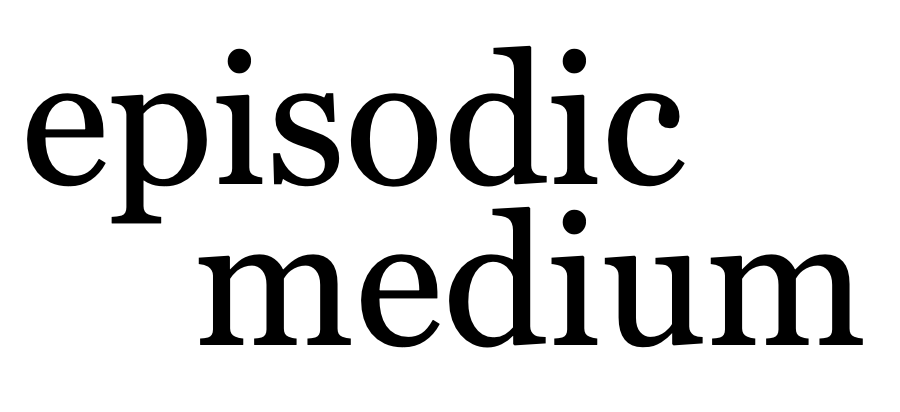
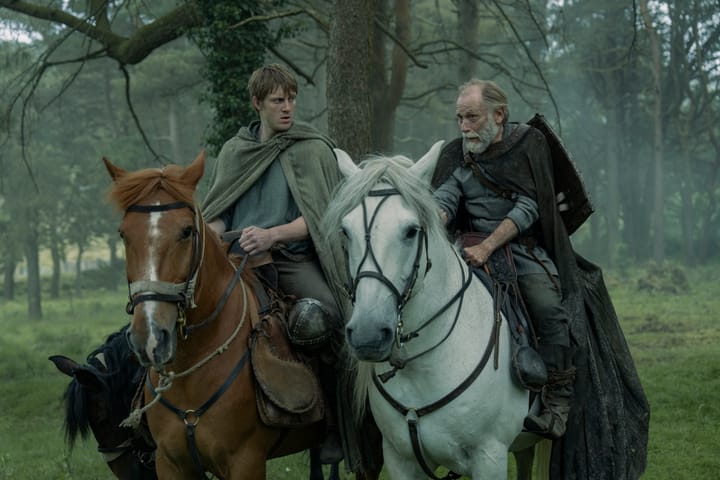
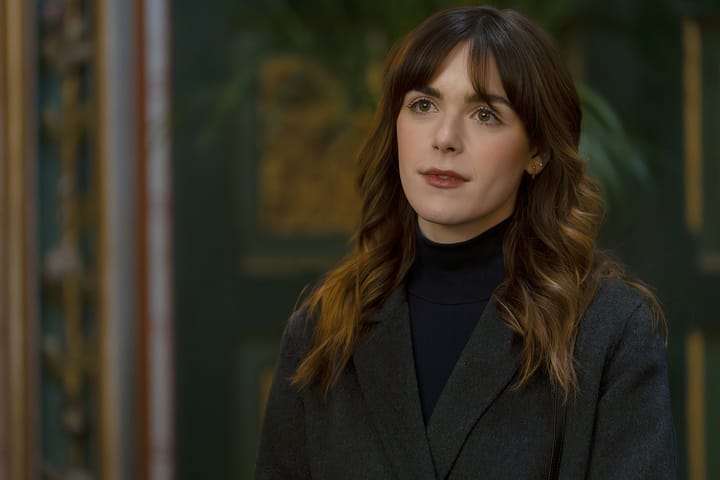
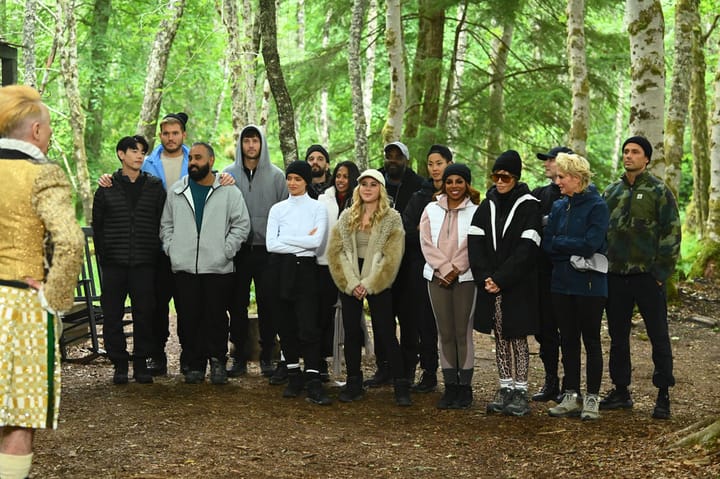
Comments ()